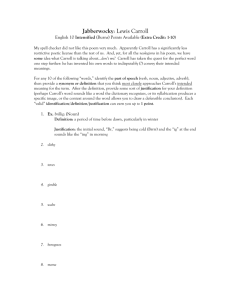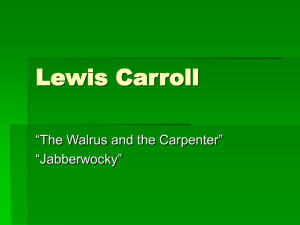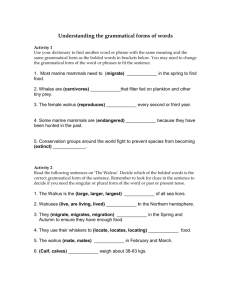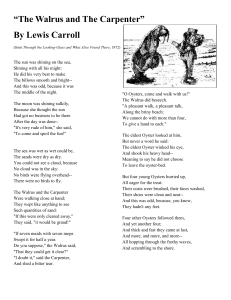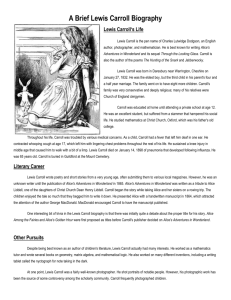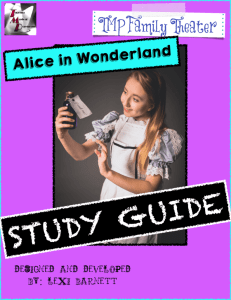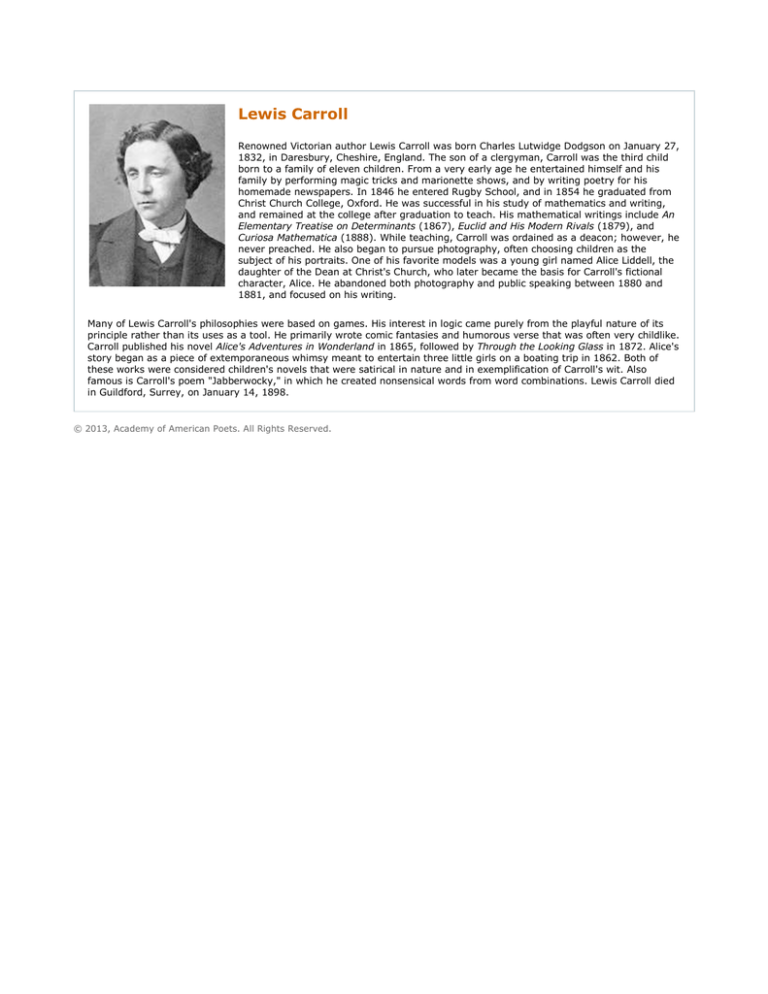
Lewis Carroll
Renowned Victorian author Lewis Carroll was born Charles Lutwidge Dodgson on January 27,
1832, in Daresbury, Cheshire, England. The son of a clergyman, Carroll was the third child
born to a family of eleven children. From a very early age he entertained himself and his
family by performing magic tricks and marionette shows, and by writing poetry for his
homemade newspapers. In 1846 he entered Rugby School, and in 1854 he graduated from
Christ Church College, Oxford. He was successful in his study of mathematics and writing,
and remained at the college after graduation to teach. His mathematical writings include An
Elementary Treatise on Determinants (1867), Euclid and His Modern Rivals (1879), and
Curiosa Mathematica (1888). While teaching, Carroll was ordained as a deacon; however, he
never preached. He also began to pursue photography, often choosing children as the
subject of his portraits. One of his favorite models was a young girl named Alice Liddell, the
daughter of the Dean at Christ's Church, who later became the basis for Carroll's fictional
character, Alice. He abandoned both photography and public speaking between 1880 and
1881, and focused on his writing.
Many of Lewis Carroll's philosophies were based on games. His interest in logic came purely from the playful nature of its
principle rather than its uses as a tool. He primarily wrote comic fantasies and humorous verse that was often very childlike.
Carroll published his novel Alice's Adventures in Wonderland in 1865, followed by Through the Looking Glass in 1872. Alice's
story began as a piece of extemporaneous whimsy meant to entertain three little girls on a boating trip in 1862. Both of
these works were considered children's novels that were satirical in nature and in exemplification of Carroll's wit. Also
famous is Carroll's poem "Jabberwocky," in which he created nonsensical words from word combinations. Lewis Carroll died
in Guildford, Surrey, on January 14, 1898.
© 2013, Academy of American Poets. All Rights Reserved.
The Walrus and the Carpenter
by Lewis Carroll
The sun was shining on the sea,
Shining with all his might:
He did his very best to make
The billows smooth and bright-And this was odd, because it was
The middle of the night.
The moon was shining sulkily,
Because she thought the sun
Had got no business to be there
After the day was done-"It's very rude of him," she said,
"To come and spoil the fun!"
The sea was wet as wet could be,
The sands were dry as dry.
You could not see a cloud because
No cloud was in the sky:
No birds were flying overhead-There were no birds to fly.
The Walrus and the Carpenter
Were walking close at hand:
They wept like anything to see
Such quantities of sand:
"If this were only cleared away,"
They said, "it would be grand!"
"If seven maids with seven mops
Swept it for half a year,
Do you suppose," the Walrus said,
"That they could get it clear?"
"I doubt it," said the Carpenter,
And shed a bitter tear.
"0 Oysters, come and walk with us!"
The Walrus did beseech.
"A pleasant walk, a pleasant talk,
Along the briny beach:
We cannot do with more than four,
To give a hand to each."
The eldest Oyster looked at him,
But never a word he said;
The eldest Oyster winked his eye,
And shook his heavy head-Meaning to say he did not choose
To leave the oyster-bed.
But four young Oysters hurried up,
All eager for the treat:
Their coats were brushed, their faces washed,
Their shoes were clean and neat-And this was odd, because, you know,
They hadn't any feet.
Four other Oysters followed them,
And yet another four;
And thick and fast they came at last,
And more and more and more-All hopping through the frothy waves,
And scrambling to the shore.
The Walrus and the Carpenter
Walked on a mile or so,
And then they rested on a rock
Conveniently low:
And all the little Oysters stood
And waited in a row.
"The time has come," the Walrus said,
"To talk of many things:
Of shoes--and ships--and sealing-wax-Of cabbages--and kings-And why the sea is boiling hot-And whether pigs have wings."
"But wait a bit," the Oysters cried,
"Before we have our chat;
For some of us are out of breath,
And all of us are fat!"
"No hurry!" said the Carpenter.
They thanked him much for that.
"A loaf of bread," the Walrus said,
"Is what we chiefly need:
Pepper and vinegar besides
Are very good indeed-Now, if you're ready, Oysters dear,
We can begin to feed."
"But not on us!" the Oysters cried,
Turning a little blue.
"After such kindness, that would be
A dismal thing to do!"
"The night is fine," the Walrus said,
"Do you admire the view?
"It was so kind of you to come!
And you are very nice!"
The Carpenter said nothing but
"Cut us another slice.
I wish you were not quite so deaf-I've had to ask you twice!"
"It seems a shame," the Walrus said,
"To play them such a trick.
After we've brought them out so far,
And made them trot so quick!"
The Carpenter said nothing but
"The butter's spread too thick!"
"I weep for you," the Walrus said:
"I deeply sympathize."
With sobs and tears he sorted out
Those of the largest size,
Holding his pocket-handkerchief
Before his streaming eyes.
"0 Oysters," said the Carpenter,
"You've had a pleasant run!
Shall we be trotting home again?"
But answer came there none-And this was scarcely odd, because
They'd eaten every one.
© 2013, Academy of American Poets. All Rights Reserved.
Jabberwocky
by Lewis Carroll
'Twas brillig, and the slithy toves
Did gyre and gimble in the wabe;
All mimsy were the borogoves,
And the mome raths outgrabe.
"Beware the Jabberwock, my son
The jaws that bite, the claws that catch!
Beware the Jubjub bird, and shun
The frumious Bandersnatch!"
He took his vorpal sword in hand;
Long time the manxome foe he sought—
So rested he by the Tumtum tree,
And stood awhile in thought.
And, as in uffish thought he stood,
The Jabberwock, with eyes of flame,
Came whiffling through the tulgey wood,
And burbled as it came!
One, two! One, two! And through and through
The vorpal blade went snicker-snack!
He left it dead, and with its head
He went galumphing back.
"And hast thou slain the Jabberwock?
Come to my arms, my beamish boy!
O frabjous day! Callooh! Callay!"
He chortled in his joy.
'Twas brillig, and the slithy toves
Did gyre and gimble in the wabe;
All mimsy were the borogoves,
And the mome raths outgrabe.
© 2013, Academy of American Poets. All Rights Reserved.
The Crocodile
by Lewis Carroll
How doth the little crocodile
Improve his shining tail,
And pour the waters of the Nile
On every golden scale!
How cheerfully he seems to grin,
How neatly spreads his claws,
And welcomes little fishes in,
With gently smiling jaws!
A Boat, beneath a sunny sky
by Lewis Carroll
A boat, beneath a sunny sky
Lingering onward dreamily
In an evening of July—
Children three that nestle near,
Eager eye and willing ear,
Pleased a simple tale to hear—
Long has paled that sunny sky:
Echoes fade and memories die:
Autumn frosts have slain July.
Still she haunts me, phantomwise,
Alice moving under skies
Never seen by waking eyes.
Children yet, the tale to hear,
Eager eye and willing ear,
Lovingly shall nestle near.
In a Wonderland they lie,
Dreaming as the days go by,
Dreaming as the summers die:
Ever drifting down the stream—
Lingering in the golden gleam—
Life, what is it but a dream?

